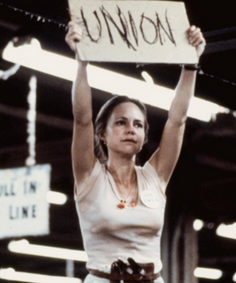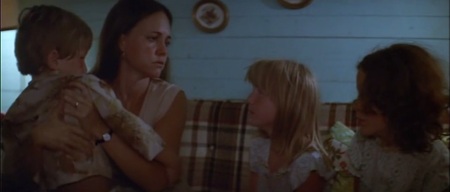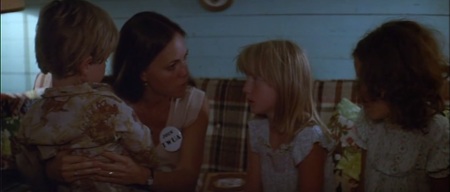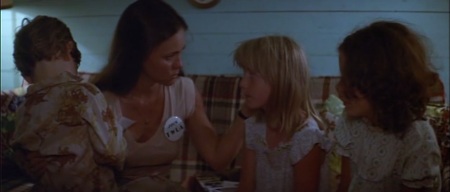Cannes Monologue: Norma Rae
 Monday, May 26, 2014 at 9:29PM
Monday, May 26, 2014 at 9:29PM  Andrew's Cannes-inspired subseries in our Monday Monologue tradition ends with Sally Field in Norma Rae, one of only four Best Actresses to win both Cannes and the Oscar...
Andrew's Cannes-inspired subseries in our Monday Monologue tradition ends with Sally Field in Norma Rae, one of only four Best Actresses to win both Cannes and the Oscar...
Is Julianne Moore finally going to get that Oscar? Blame it on the human urge to tie everything down to laurels, but it seems that's biggest wishful-thinking question coming out of Cannes after the awards ceremony. It’s not enough that she’s recently joined Juliette Binoche as one of the few “European Best Actress Triple Crown” winners –the allure of Oscar is hard to resist. Cannes and Oscar rarely measure up, of course, but it seems like a good excuse to look back to one of only two performance to manage both Best Actress wins in the last 50+ years: Sally Field in Norma Rae (1979)...
The monologue we'll discuss today comes after one of Norma's loudest moments. After a standoff with the management, the sheriff is summoned to arrest her and Norma Rae screams all the way to the squad car. She makes bail a few hours later and arrives home looking like a wounded soldier coming off the battlefield. It’s a taut moment as she makes her way through the house. What now? Will she rail against the injustices meted out to her? Will she sob? Will she rave? No, she heads to her children’s room – two of them biological, one the daughter of her recent husband.
What follows in this initially uncertain 'where-is-this-scene-going?' moment, is the finest scene in Sally's performance...

Craig. Honey, wake up. It's Mama. Wake up, sugar, I wanna talk to you. Come on. Put your arms around my neck. Alice, wake up. Millie, wake up. I wanna talk to you, sweetheart. Come on in the living room. Come on. Attagirl.
I love you kids. That's the first thing. And Sonny loves you. You got the both of us."
Mainstream movie's habit of building the character of the female protagonist through the lens of her motherhood can seem perfunctory. Except, Norma is a full character. She's a working class woman felled by society, for being too loud, for being sexual, for being a woman. It’s not unsurprising that she will hold on to her maternal role.
The moment works more because of Sally's performance than the writing.
Second thing is... I'm a jailbird. Now, you're gonna be hearin' that, and a lot of other things. But you're gonna hear it from me first."
It’s at this point where the scene turns subtley from a confession to a children to 'confession to myself'. All three children are under 11. At this point they might not even understand the what and why of Norma’s treatise. But it’s an important moment for Norma to face herself and to lay herself down forjudgement. Imagine what a woman with three children (two biological) each from different fathers would have endured in this era. It should be nonissue, but it's not. There’s not so much the sense that Norma is embarrassed of herself, but matter-of-factness. Sally plays it calm, defiant and with self-acceptance.

"Millie... your daddy, his name was Buddy Wilson. And he died four months after you was born. Craig...I wasn't never married to your daddy. And he wasn't Buddy. And he's not Sonny. He's another man. And there have been others in my life. You're gonna be hearin' about them, too.
I'm not perfect. I made mistakes. Millie, these are pictures of your daddy. Craig, I got pictures of your daddy. They belong to you."
The flawed-character-as-reluctant-hero trope is one family but it’s essential to Norma Rae. In an earlier scene with Reuben she admits that sometimes she’s too much. Sometimes she’s not a very nice person. But this isn’t a film called Saint Norma. Sally Field, unlike some of her contemporaries, is not a chameleon who is adept at sinking into varying roles. She has a type, and is an expert at carving new creations from the familiar template of a woman who is barely keeping it together for the sake of their families and for the sake of their own sanity until the pressure is too much. The breaking point for Norma is not a loud one like M'Lynn's or Mary Todd Lincoln, but it is instead a breakthrough marked by quietness. It's this scene which sends the film into its coda.
So often in movies we see a character unable to completely forge their future until meeting their past. And, that moment works especially well in Norma Rae because of this evocative monologue.

"If you go in the mill, I want life to be better for you than it is for me. That's why I joined up with the union, and that's why I got fired for it. You understand me? Now, you kids...you know what I am. And you know that I believe in standin' up for what I think is right."
There is real sadness in this statement but Sally's voice remains unusually calm. Norma’s belief that this the mill where her children will end up is heartbreaking, but as the audience we realise that she's probably right. Her family worked in the mill for decades, her father – due to management neglect – dies there earlier in the film, her mother is losing her hearing working there. These are simple people and Norma’s acknowledgement that the mill is all that's open to them is moving in the way it acknowledges and comes to grips with a bleak future.
And yet, like Sally’s performance – acknowledging the hard truth but refusing to go down without a fight – there is hope in these lines, too. They might be stuck in the mill, but they’re not going to lay down and accept just anything that comes their way. This a battle cry for future generations but also a gentle explanation to Sonny, Norma's current man who’s listening, why she is the way she is. Most significantly, though, it’s an affirmation from Norma to herself representing her entire ideology. She is who she is and she’s going to stand up for what she believes in, no matter what the future may hold.
It’s not the rousing showpiece of a moving of rebellion that we expect from a movie like Norma Rae about Union organization, but in its quiet firmness it’s the strongest moment of the film.

* Winning Cannes Best Actress and the Academy Award is extremely rare. In the history of both traditions it's happened just four times: Simone Signoret (Room at the Top, 1959), Sophia Loren (Two Women, 1961), Sally Field (Norma Rae, 1979) and Holly Hunter (The Piano, 1993)



Reader Comments (13)
This performance is INCREDIBLE.
Not a Sally Field fan. I'm actually surprised this performance won
both Cannes & Oscar...
Great insight into her performance. I love Sally and you're right she's has a type, part of her longevity is her realizing that I think. She understands her strengths and pursues roles that she can bring to life because she understands them. It's appalling after her brilliant work in Lincoln that the only thing she's found to do is playing Aunt May in Spiderman, she should be flooded with work.
It's been years since I watched Norma Rae but I'm going to take another look at it now with your comments in mind.
Sadly I still need to watch Norma Rae, but I honestly secretly wish Bette Midler won for The Rose... lol
Julianne will be the fifth to achieve this feat!
Hold on you guys! Julianne's role doesn't look like the Oscars type.
Let me confess one thing: I still haven't seen Norma Rae. It's probably my biggest gap in actressexuality.
Well, Julianne could actually win in Supporting for MTTS.
Ugh, now they all scream "Hell no! Not SUPPORTING! It's LEAD or NOTHING!"
But I say why not? I'm in the minority that just don't see a supporting win any lesser than a lead.
Christoph Waltz won in Cannes and won the Oscar for IB. That was, is and will always be a great performance, even better than the lead performance (Sorry Jeff...).
BOTH supporting wins were miles better than the lead ones in 2009.
I'll always root for J Moore...she's been amazing in so many roles like Single Man, Far from Heaven, Hours, Game Change, etc. As for Norma Rae, let's just say I find Sally's performance competent if not adequate. At least it was better than her second Oscar win (Places in the Heart).
Julianne may be put in support due to it being an easier get and I have a feeling it's Chastains year.
Love me some Sally so good in Lincoln.
What exactly constitutes the European Actress Triple Crown?
@John T
Berlin, Cannes, Venice film festivals.
What do you think about Charlize Theron's performance in North Country compared to Sally's in Norma Rae, similar narratives with great performances